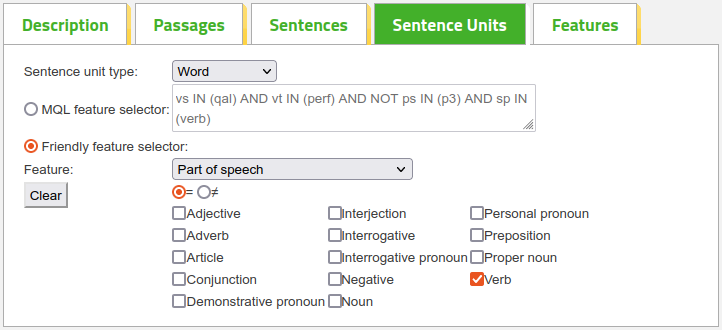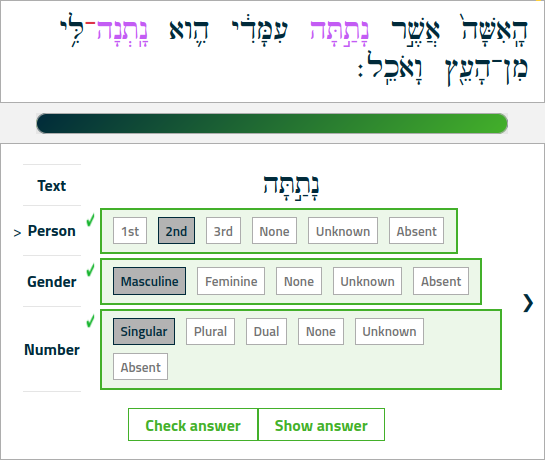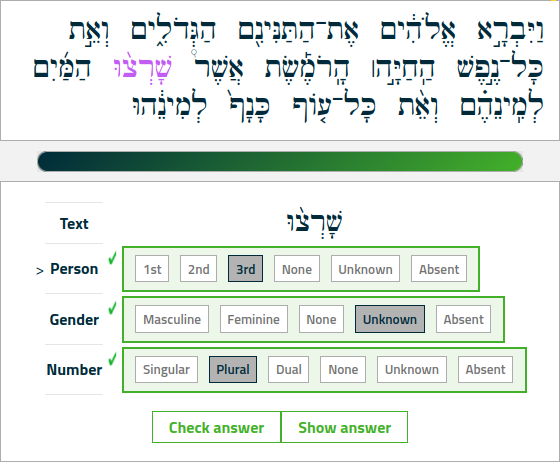Help pages
Example: First Hebrew exercise
Example: Second Hebrew exercise
Example: Third Hebrew exercise
Example: Second Greek exercise
Example: Create a simple Hebrew exercise
Example: Create an advanced Hebrew exercise
Example: Create a simple Greek exercise
Andrews University Final Exam: Hebrew I (OTST551)
Andrews University Final Exam: Hebrew II (OTST552)
Andrews University Final Exam: Advanced Hebrew (OTST625)
Andrews University Hebrew Placement Exam
Hebrew Proficiency Exam for OTST Exegesis classes
Andrews University Final Exam: Intermediate Greek (NTST552)
Andrews University Greek Placement Exam
Example: Create an Advanced Hebrew Exercise
(You may be interested in a corresponding Greek exercise.)
In this example we shall continue working with the exercise from the previous example.
In the previous example, we created an exercise that found Hebrew verbs in the qal qatal forms and asked the student about the person, gender, and number of these verbs. We saw, furthermore, that most verbs are in the third person masculine singular, so we chose to exclude all third person verbs.
So far so good; but suppose we don’t mind that words in the third person occasionally turn up. We might, for example, say that when choosing sentences we insist that they must contain words in the first or second person, but we don’t mind if the chosen sentence units (words) are in the third person if the sentence happens to contain such words. We can do that in this way:
In the “Sentences” tab, remove the check mark next to “Use this for sentence unit selection”. This enables you to use different criteria when choosing sentences and when choosing words within the sentence. Now click the “Sentence Units” tab:
You can see that this tab is very similar to the “Sentences” tab, but the first few lines come in a slightly different order. Depending on how you reached this point, this window may show different things. If you started with an empty exercise, the window will show no selected features. But if you opened the exercise using Edit in the File Manager, the window will show the original content of the sentence choice criteria. This may be a bit confusing, but if you press the “Clear” button, all the criteria in this tab are removed.
Just as you originally did under “Sentences”, you can here choose Part-of-speech=Verb, Stem=Qal and Tense=Qatal. But refrain from specifying any requirements about the Person feature. In this way you allow the program to ask about third person verbs if they happen to occur in the chosen sentences.
You can now run the exercise again, and you might get this sentence from Genesis 3:12:
You can see that – as requested – the sentence contains at least one word which is not in the third person; but as the sentence also happens to contain a third person verb (namely, נָֽתְנָה), you are asked about this one as well. (In this example, you need to click the ❯ symbol at the right side of the answer box to see that word.)
But even this is not ideal. We saw earlier that among the present tense forms there was an excess of third person masculine singular forms. We have now chosen to exclude sentences that only contain verbs in the third person, but we were actually only interested in excluding words in the third person masculine singular. We don’t mind words in the third person feminine or plural.
But if we want to exclude only the third person masculine singular, the feature selectors we have seen so far will not suffice. We need sentences containing words whose part of speech is verb, whose stem is qal, whose tense is perfect, and whose person, gender, and number are not simultaneously 3rd, masculine, and singular. This is a fairly complex rule and you rarely need to specify something as complicated as this. You can specify this in Bible OL, but you need to use the command language MQL.
If you are not interested in more complex sentence choices using MQL, you can skip the rest of this example. But if you want a small taste of how MQL is used, you may return to the “Sentences” tab and select the option “MQL statement to select sentences”:
The system here shows an MQL command that corresponds to the features we
have chosen: [word NORETRIEVE vs IN (qal) AND vt IN (perf) AND NOT ps IN (p3) AND sp IN (verb)].* This statement begins with the word “word” which indicates the type of sentence units
we are looking for. The word “NORETRIEVE” has no effect on the choice, but it makes
the request run faster. The rest of the command contains our four selection criteria:
| MQL | Meaning |
|---|---|
vs IN (qal) | verbal stem is qal |
vt IN (perf) | verbal tense is perfect, that is, qatal |
NOT ps IN (p3) | person is not 3rd person |
sp IN (verb) | speech part is verb |
The criteria are separated by the word “AND”.
If you replace the code “NOT ps IN (p3)” with “NOT (ps IN (p3) AND
gn IN (m) AND nu IN (sg))”, you indicate that you do not wish the third person,
masculine, and singular at the same time. The modified MQL statement now reads: [word
NORETRIEVE vs IN (qal) AND vt IN (perf) AND NOT (ps IN (p3) AND gn IN (m) AND nu IN (sg)) AND sp
IN (verb)].
When you run the exercise, most of the sentences will show no difference from before. But occasionally you will come across a sentence such as Genesis 1:21:
This sentence was chosen because it contains a third person plural verb. (The gender is unknown here because there is no difference between the masculine and feminine 3rd person plural form of the verb.)
You can read more about the sentence units tab here.



